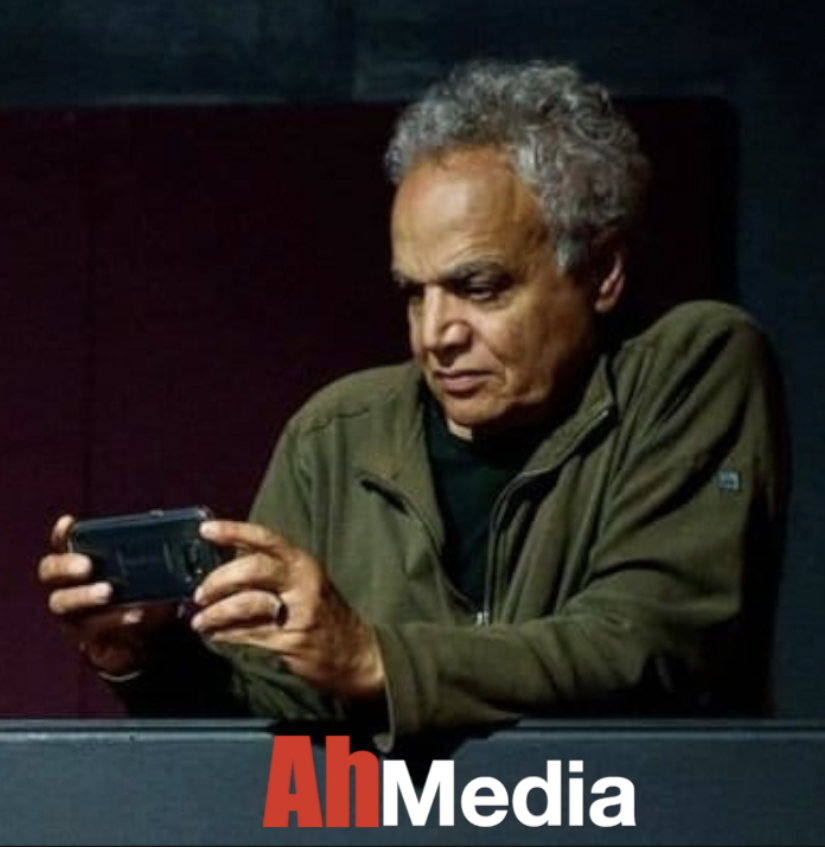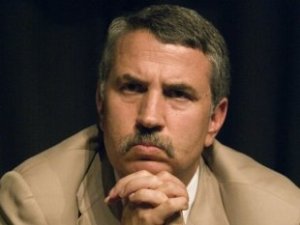Thomas Friedman, the winner of three Pulitzer prizes, the New York Times foreign affairs columnist, with host of bestseller books, a man known for his big ideas. Friedman never ceases to amaze us with a new ‘big idea’ every now and then, from the bizarre to the ridiculous. Consider these examples. First, there is the ‘burger’ war theory: “No two countries with McDonalds go to war with each other”, but when they do, as Belén Fernández reported in Alter Net online magazine, “… in which case it is preferable if the outcome of the conflict indicates that Serbs ‘wanted to stand in line for burgers, much more than they wanted to stand in line for Kosovo.’
Or consider this big idea, in “The world is Flat,” in which he discovered that the Internet leveled the playing field, and an Indian man with a modem can now compete with General Motors, or IBM. In his book, “The Lexus and the Olive Tree,” Mr. Friedman professed that ‘Globalization is what is new…world affairs today can only be explained as the interaction between what is new as an Internet website, and what is old, as a gnarled olive tree on the banks of the river Jordan.'(p.25)
It is worth noting that this book was primarily based on one visit to an automated car plant in Tokyo, where cars are made almost entirely by robots. Would it have been a different premise if he had visited a sweatshop in China, or Vietnam? On his return on a train, he read an article about people in Beirut and Jerusalem who were fighting over who owned which olive tree, and, hence, the juxtaposition of these two ideas.
I would contend that rather than a big idea, what is behind most of the fighting around the worlds is competition for resources. Mr. Friedman has a great affinity for what is new and what modern technology can offer humanity in solving our social and cultural problems,
Thomas Friedman also has a knack for ignoring history, facts, and socio-political realities; he can reduce a complicated social issue to a sound bite and a six-grade essay, and he build his big ideas, based on anecdotal personal experience, or a friend or a trip to place or conversation in hotel bar, here is a templet to how to write like Thomas Friedman, BY MICHAEL WARD
.. CREAT YOUR OWN THOMAS FRIEDMAN OP-ED COLUMN
Here are a few more of his big ideas over the last 20 years, as researched by Belén Fernández, enjoy the ride!
*2004: If the U.S. lowers its profile in the Arab world, the Arabs will realize that their children are being outperformed academically by the children of their maids.
*2003: Saudi Arabia suffers from an excess of democracy.
*2002 Massacres of Muslims are a sign of freedom.
* and most of all he thinks that:
“…. the Iraq war was the most radical-liberal revolutionary war the U.S. has ever launched.”
Big ideas, indeed.
In his new column in the Times last week, he came up with another big idea, an idea that is so outlandish and out of step with history that it takes my breath away. In the “world according to Friedman,” “Dubai is the capital of the Arab Spring — the real revolution started here.” Yes, folks, and he had more than 3 years to think and research this little ‘gem’ of an idea. He goes on to explain, “The Arab awakening did not start because they wanted freedom and democracy. It started in the mind of the average (Arab) who the saw the evidence in Dubai that we could do things that are hard, and we could do them world class (like Dubai Ports and Emirates Airlines).” So it wasn’t the years of Mubarak, Ben Ali, Gaddafi, Salah, and the Bashar dictatorship that sparked the awakening of democracy after all.
I have been watching the Arab Spring closely, have written about it and talked about it extensively. I have been in Egypt three times for extended visits since the revolution. I attended three “One Million Man” marches in Tahrir Square, and during all this time, I never saw a sign for Dubai, the Emirates, or even one chant expressing the right to have a fine, clean airline; the right to have clean bathrooms maybe. Of course as orientalist mindset, Mr. Friedman can understand Arab mind more than Arabs themselves.
As a matter of fact, the Arab Spring started with the escape of the Tunisian dictator Ben Ali, and he went, of all places, to Saudi Arabia, which along with Dubai, and the Emirate sheikhs, are leading a vicious bloody counter revolution, supporting the regimes of old dictators to return them back to power. In Egypt, Tunisia, Yemen, and Syria, these powers are making sure that the Arab Spring is dead on arrival before reaching the kingdom’s gates.
Based on Mr. Friedman’s almost racist analysis and oversimplification of Arabs and their struggle, we can surmise that he thinks Arabs don’t aspire for freedom and dignity, like in the west, but rather, they just want malls, iPhones, and good clean airliners like in Dubai and the Emirates
.
The “Mr. Big Idea Man” offers his simple theories instead of getting into the real issue of western imperialist policy in the Middle East, and the failure of its military expansionism in Iraq and Afghanistan, “So if the Middle East is a region we can neither fix nor ignore, what’s left? I’m for “containment” and “amplification,” he explains. Are we to understand that the problem is that Arabs aspire not to become free citizens with personal dignity and smart leaders, but to become free consumers with an iPod and smartphone. Time for a new big idea man, I’d say.
Ahmed Tharwat
Host/Producer/
Arab American TV show Belahdan
A show with accent for those without one
Airs on Public TV, Mondays, 10:30pm
Minnetonka, MN
Blogs at The Middle
www.ahmediatv.com
www.twitter.com/ahmediatv
www.facebook.com/ahmediatv
Ahmed Tharwat,,
To help to CREATE YOUR OWN THOMAS FRIEDMAN OP-ED COLUMN.
BY MICHAEL WARD
“DISORDER AND DREAMS IN [COUNTRY IN THE NEWS]”
Last week’s events in [country in the news] were truly historic, although we may not know for years or even decades what their final meaning is. What’s important, however, is that we focus on what these events mean [on the ground/in the street/to the citizens themselves]. The [media/current administration] seems too caught up in [worrying about/dissecting/spinning] the macro-level situation to pay attention to the important effects on daily life. Just call it missing the [desert for the sand/fields for the wheat/battle for the bullets].
When thinking about the recent turmoil, it’s important to remember three things: One, people don’t behave like [computer programs/billiard balls/migratory birds], so attempts to treat them as such inevitably look foolish. [Computer programs/Billiard balls/Migratory birds] never suddenly [blow themselves up/shift their course in order to fit with a predetermined set of beliefs/set up a black market for Western DVDs]. Two, [country in question] has spent decades [as a dictatorship closed to the world/being batted back and forth between colonial powers/torn by civil war and ethnic hatred], so a mindset of peace and stability will seem foreign and strange. And three, [hope/freedom/capitalism] is an extraordinarily powerful idea.
When I was in [country in question] last [week/month/August], I was amazed by the [people’s basic desire for a stable life/level of Westernization for such a closed society/variety of the local cuisine], and that tells me two things. It tells me that the citizens of [country in question] have no shortage of [courage/potential entrepreneurs/root vegetables], and that is a good beginning to grow from. Second, it tells me that people in [country in question] are just like people anywhere else on this great globe of ours.
So what should we do about the chaos in [country in question]? Well, it’s easier to start with what we should not do. We should not [ignore the problem and pretend it will go away/lob a handful of cruise missiles and hope that some explosions will snap [country in question]’s leaders to attention/let seemingly endless frustrations cause the people of [country in question] to doubt their chance at progress]. Beyond that, we need to be careful to nurture [the seeds of democratic ideals/the fragile foundations of peace/these first inklings of a moderate, modern society]. The opportunity is there, but I worry that the path to [peace/stability/moderation] is so [narrow/poorly marked/strewn with obstacles] that [country in question] will have to move down it very slowly.
Speaking with a local farmer on the last day of my recent visit, I asked him if there was any message that he wanted me to carry back home with me. He pondered for a second, and then smiled and said, “[Short phrase in indigenous language],” which is a local saying that means roughly, “[Every branch of the tree casts its own shadow/That tea is sweetest whose herbs have dried longest/A child knows his parents before the parents know their child].”
I don’t know what [country in question] will be like a few years from now, but I do know that it will [probably look very different from the country we see now/remain true to its cultural heritage], even if it [remains true to its basic cultural heritage/looks very different from the country we see now]. I know this because, through all the disorder, the people still haven’t lost sight of their dreams.

